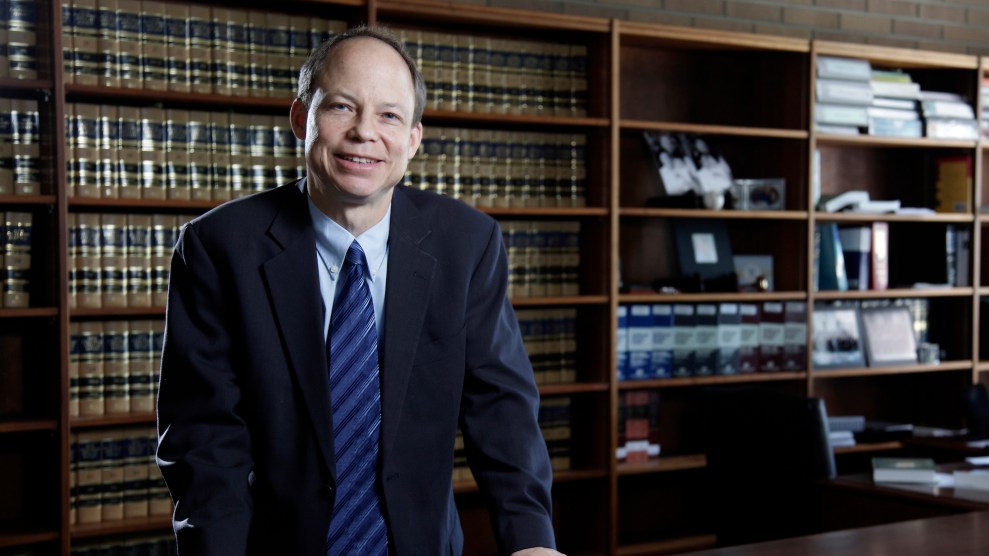
Jason Doiy/AP
It’s been more than a year since Brock Turner was sentenced to six months in county jail, plus probation, for sexually assaulting an unconscious woman behind a dumpster by Santa Clara County Superior Court Judge Aaron Persky—and a year since Stanford Law professor Michele Dauber, a family friend of the victim, launched a campaign to unseat Persky through a recall election.
That recall election, an unusual legal mechanism by which California allows voters to remove judges from office before the end of their six-year terms, just passed its next hurdle: On Monday, Persky opponents filed a notice that they intend to petition to get the judge’s name onto a ballot next year. The next step is to gather 58,634 signatures from county residents in support of the recall over the next 160 days.
Judicial elections, though, and specifically recall elections, are much more complex than a simple referendum on the person in question. Persky is anchoring his retention campaign in a message of judicial independence. Meanwhile, the campaign to unseat him is using the same issue to argue the opposite: “It is the very fact that judges like Persky often exercise ‘discretion’ in favor of defendants like Brock Turner that preserves a system in which poor and minority defendants receive long sentences to which the Brock Turners of the world will never have to be subject.” Then there are also groups of California law professors, former Stanford law students, and even public defenders who are argue that, in general, holding a recall could have unexpected consequences, like promoting a “tough on crime” attitude among other judges who might fear their own recall elections.
To help understand some of the unanticipated ramifications of a recall, Mother Jones recently spoke with Alicia Bannon, a senior counsel at New York University’s Brennan Center for Justice and an expert on fair courts. Here are the key takeaways:
-
-
- The pressures of an election year push judges to be harder on criminal defendants. Political scientists have found repeatedly that as an election approaches, judges running for their seats become less likely to rule in favor of defendants, including death penalty appellants. They also hand down longer prison sentences in attempts to avoid decisions that could be unpopular with voters, who have historically opposed candidates viewed as being “soft on crime.” “It’s a deeply troubling finding,” Bannon says. “It’s not the job of the judge to make a decision that’s popular.” One analysis, which looked at 10 years of sentencing data from Pennsylvania, estimated that 2,000 years worth of extra prison time for people convicted of aggravated assault, rape, and robbery could be attributed to the skewed decision-making of judges who were approaching an election.
-
- A judge’s name doesn’t have to be on the ballot for him or her to be influenced by election politics. While Persky requested a transfer to civil court soon after the Turner ruling, meaning he himself can’t install harsher sentencing, there’s evidence that the threat of having to face the pressure of an election could create similar effects on other judges. One 2014 study examined data from supreme court decisions in 32 states, as well as television ads in state supreme court races. It found that the more ads that ran in a given year, the less likely justices (including those not up for election) were to vote in favor of defendants that year—for example, by overturning their convictions or reducing their sentences. Judges watch TV, too, and when they saw interest groups funding attack ads against their colleagues, Bannon explains, they worried that they might be targeted next time. In one 1996 judicial retention election, for instance, a campaign attacked Tennessee Supreme Court Justice Penny White for being soft on crime after she upheld a man’s conviction for rape and murder but overturned his death sentence. “For a while at least, ‘Penny White’ became a verb,” Bannon says. “People talked about not wanting to be ‘Penny Whited‘ in their own elections. Even if it doesn’t happen very often that a judge loses her seat, it can cast a long shadow.” Bannon believes that even if the Persky recall fails, judges could still feel its influence. Voters are sending a message, she says: “‘We’re watching what you’re doing, and if we’re not happy with your sentencing decisions, you could be next.'”
-
- Minority defendants have the most to lose. “This is something that isn’t being experienced equally by everyone in our society,” Bannon says. Racial disparities in the criminal justice system mean that any time the system as a whole gets harsher, people of color are disproportionately affected. (Black males receive sentences that are 20 percent longer than those received than white males with similar cases, according to a federal analysis.) One paper, a University of Chicago dissertation, found that in Kansas judicial districts that held partisan elections, incarceration rates for black defendants rose by 2.2 to 2.6 percent in an election year, as compared to the other years of a judge’s term. For white defendants, there was no effect.
-
Of course, these complicating factors won’t sway most people who’ve made up their minds about Persky. Last year, Stanford’s Dauber told Mother Jones that some of those who oppose recalling Persky are just quibbling with the California constitution. Judges “are serving at the pleasure of the people and they are accountable to the people,” she said. “It is the constitutional right of the women and other people of Santa Clara county to call for this recall because we’re unhappy with this judge’s perspective on sexual violence.”
















